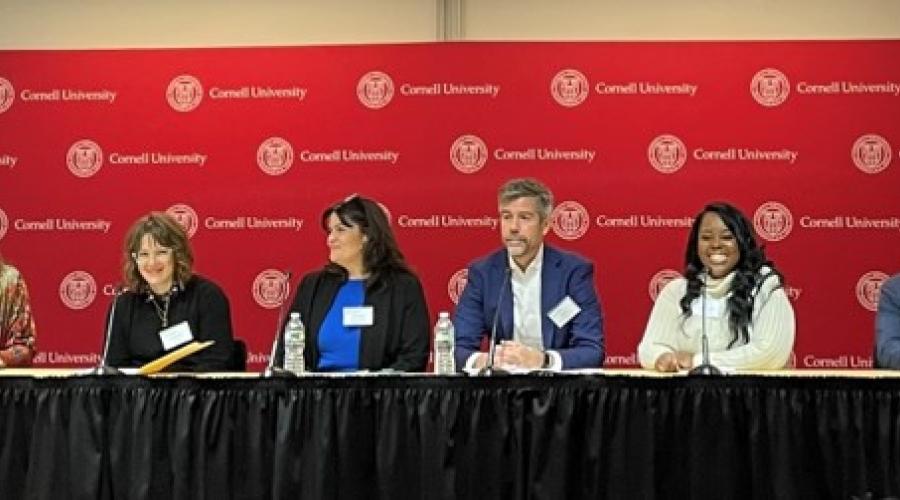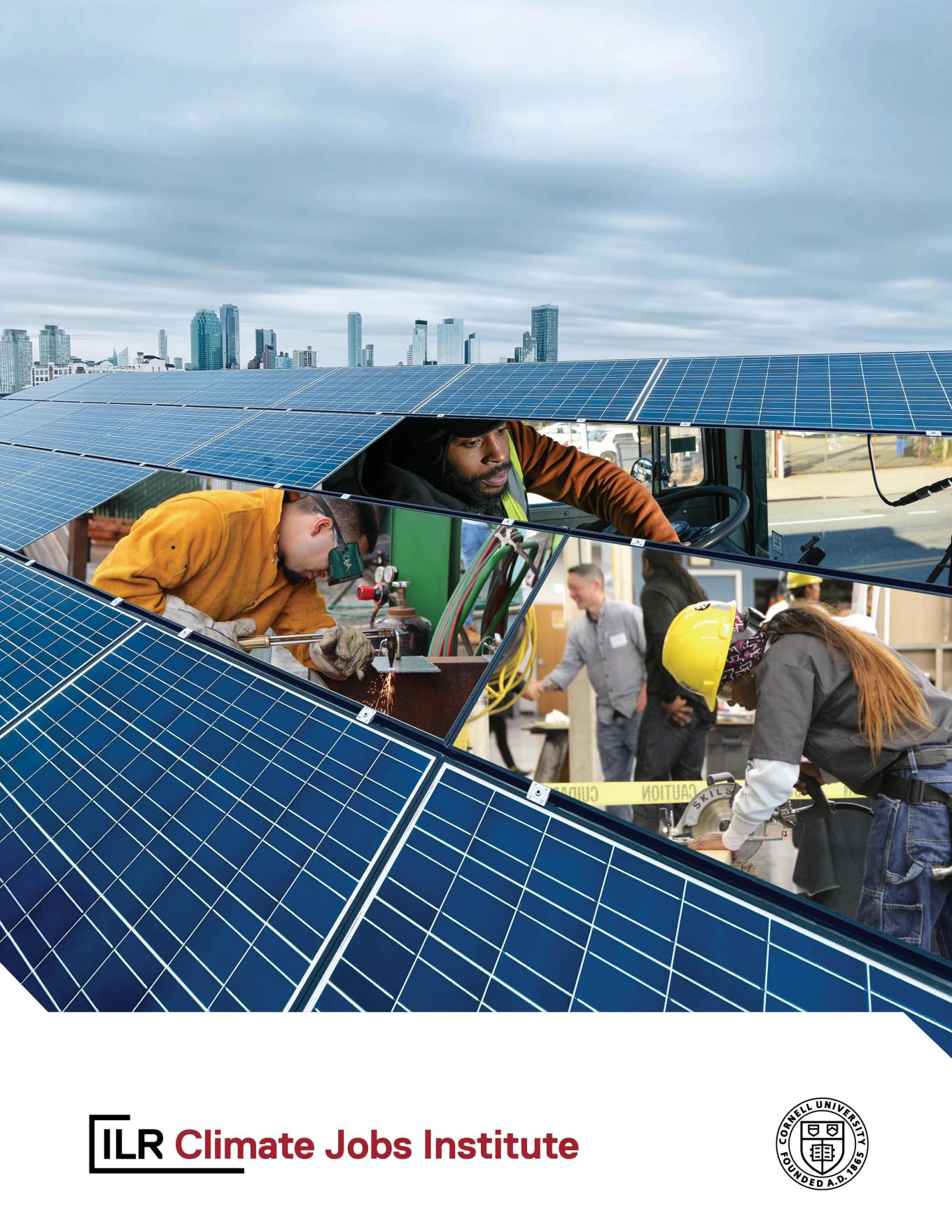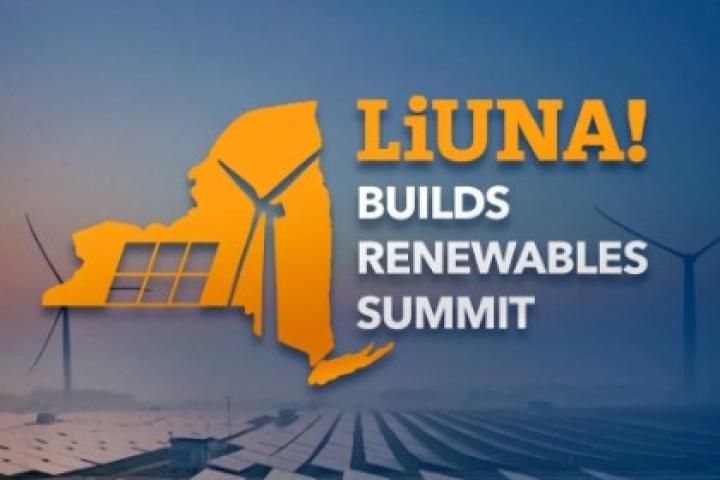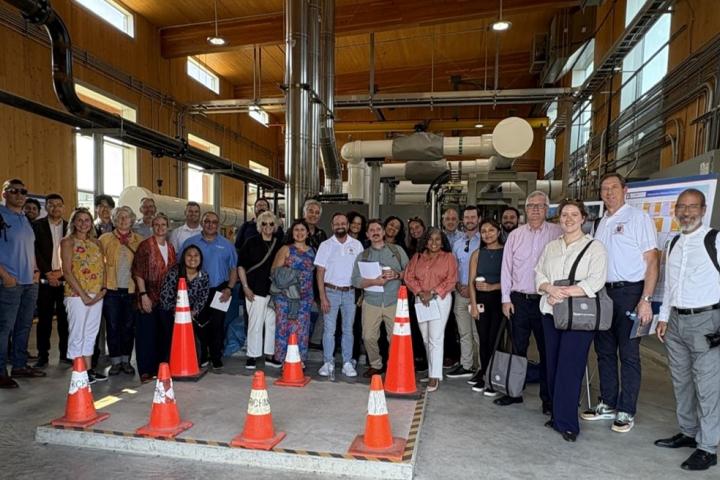
New Climate Jobs Institute Report Sees Clean Economy on the Horizon via Apprenticeship Readiness
“The time has arrived. The time was yesterday!” said New York State Senator Jessica Ramos during the launch of a new report by Cornell ILR’s Climate Jobs Institute (CJI) on Nov. 30.

The report, titled “Building an Equitable, Diverse & Unionized Clean Energy Economy: What We Can Learn from Apprenticeship Readiness,” brought leaders from across the country to the Cornell ILR Conference Center in midtown Manhattan.
“This latest report proves everything that we all know to be true, but that the rest of the world - and certainly many of my colleagues - need to read with intense, intense focus so that they can internalize the necessity, the urgency to make change happen,” said Senator Ramos, who chairs the Senate’s Committee on Labor.
The launch event highlighted key findings from the report and opened expert discussion on how to grow and expand access to high-quality jobs in the clean energy economy.
“It’s not a worker shortage. It’s a good job shortage, and if people are paid well, have good benefits and access to good training, then we will have the workforce we need to tackle climate change,” said Lara Skinner, executive director of CJI. “How do we build this complete ecosystem and pathway… from frontline communities to high-quality union careers?”
Zach Cunningham, co-author of the report and training & education associate at CJI, stepped up to answer that question, presenting the report’s findings.
“Apprenticeship readiness is not a panacea - this is not the only thing we need to do to create an equitable, diverse, and unionized clean energy economy,” said Cunningham. “Any intervention that tries to solve the climate crisis, without also trying to solve the inequality crisis – we believe, is insufficient.”
Labor leaders echoed Cunningham’s demand, especially Gary LaBarbera, president of the Building and Construction Trades Council of Greater New York. “As the opportunities are presented in the renewable industry, we will be able to more than adequately fulfill the workforce needs as long as these are family-sustaining careers. If they are simply jobs, we won’t be able to fulfill that need.”
Senator Ramos took the report launch as an opportunity to announce, for the first time publicly, new legislation “to create New York’s first-ever Youth Climate Core. And that is with the purpose of starting to create a pipeline for the youngest among us to know about pre-apprenticeship and apprenticeship programs.”
“Unions will save my district. Unions will save our country, and Unions will save our planet,” concluded Senator Ramos.
The report launch included a panel discussion with representatives of organized labor and community organizations. Melissa Shetler, co-author of the report and senior training & education associate at CJI, moderated the panel.
“I’ve worked in pre-apprenticeship for the past 15 years,” said Shetler. “Apprenticeship-readiness programs are critical tools for addressing historic inequities and ensuring we have the skilled and diverse workforce for the transition ahead.”
Panelists shared insight from three successful apprenticeship readiness programs showcased in the report: CityBuild in San Francisco, HIRE360 in Chicago, and the Apprenticeship Readiness Collective in New York City.
“Apprenticeship readiness programs are not just the curriculum,” said panelist Nicole Schwartz, executive director of TradesFutures. “There are so many other parts of the programs that make them successful: the supportive services, the mentorship, the exposure to the crafts.”
Nicole Bertran, executive vice president of the Edward J. Malloy Initiative for Construction Skills, and Jay Rowell, executive director of HIRE360, spoke to the importance of youth engagement within apprenticeship readiness programs.
Chynna Hampton, equity director of Climate Jobs Illinois – IL AFL-CIO, and Ken Nim, director of CityBuild, spoke about the crucial role of policy and government mandates in creating access to funding for organizations to offer workforce development programs.
“High tides raise all boats,” said Nim. “We all succeed if the communities we serve, especially underprivileged and underrepresented, get that opportunity.”
“I think everyone on this panel would say it is hard work, but it is the work that will take us to a place that we all envision for our communities,” said Schwartz.
“It’s so exciting to see how this [work] has grown and how we can really seize the opportunity of the moment to bring better lives to more people,” added Shetler.
This latest report will feature prominently in CJI’s upcoming statewide conference, “Generating Equity: Pathways to Union Careers in Clean Energy,” in Albany, NY, on March 1-2, 2024.
The March 2024 conference will present panel discussions, breakout sessions, and networking opportunities as CJI continues to work towards building an equitable clean energy economy in New York State.
A recording of the Nov. 30 launch event is available here.



